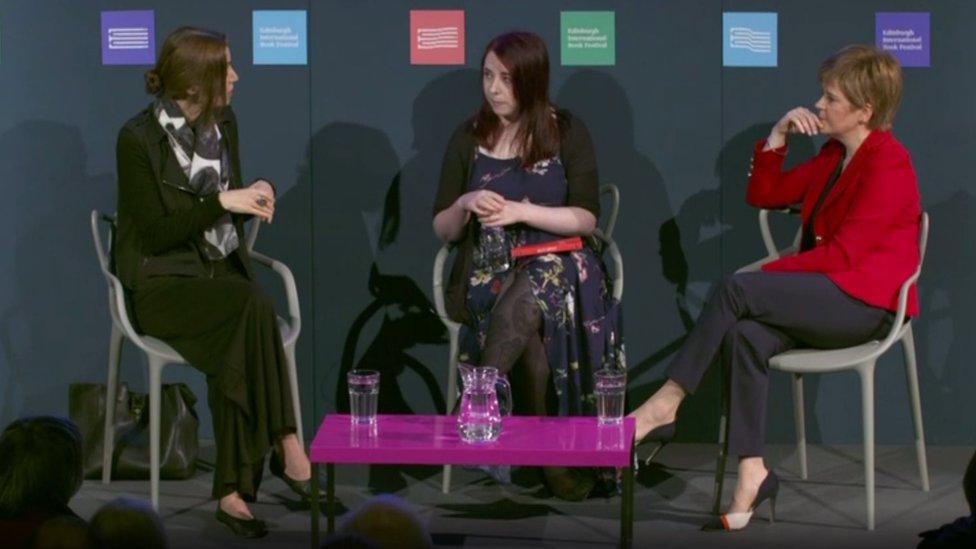Nicola Sturgeon would change SNP name
- Published
The first minister would like her party to have a name which reflects its civic nationalism
Nicola Sturgeon has said she wishes she could turn the clock back and change the Scottish National Party's name.
The SNP leader admitted the word "national" could be "hugely problematic" during a debate at the Edinburgh International Book Festival.
She was speaking with Turkish author Elif Shafak, who said the word had a "negative meaning" to her.
However, the first minister insisted her party was about self government and was not insular.
Ms Shafak, who was wrongly accused of public denigration of Turkishness for her novel The Bastard Of Istanbul, told the audience at the sold-out event: "Coming from Turkey, seeing the experiences there, not only in Turkey, across the Middle East, the Balkans, for us for instance the word nationalism is, for me personally, has a very negative meaning because I've seen how ugly it can get, how destructive it can become, how violent it can become and how it can divide people into imaginary categories and make them lose that cultural coexistence.
"Whereas when I come here, I hear the word nationalism being used in a different way and I felt that, can nationalism ever be benign? Can it ever be a benevolent thing? So there is a part of me that doubts that very much."
'Too complicated'
In response, Ms Sturgeon admitted: "The word is difficult."
She said: "If I could turn the clock back, what 90 years, to the establishment of my party, and choose its name all over again, I wouldn't choose the name it has got just now, I would call it something other than the Scottish National Party.

Nicola Sturgeon was attending an event with Elif Shafak and publisher Heather McDaid
"Now people say why don't you change its name now? Well that would be far too complicated. Because what those of us who do support Scottish independence are all about could not be further removed from some of what you would recognise as nationalism in other parts of the world.
"Two things I believe that I think run so strongly through the Scottish independence movement are firstly that it doesn't matter where you come from, if Scotland is your home and you live here and you feel you have a stake in the country, you are Scottish and you have as much say over the future of the country as I do. And that is a civic, open, inclusive view of the world that is so far removed from what you would rightly fear.
"Secondly one of the great motivators for those of us who support Scottish independence is wanting to have a bigger voice in the world, it's about being outward looking and internationalist, not inward looking and insular.
"So the word is hugely, hugely problematic sometimes for those of us who ...but Scottish independence is about self-government, it's about running your own affairs and making your own mark in the world.
"So yes words do matter but I think we can't change the connotations that the word has in other parts of the world, what we have to do is just demonstrate through words of our own, through deeds, through actions, through how we carry ourselves, that we stand for something completely different to all of that."